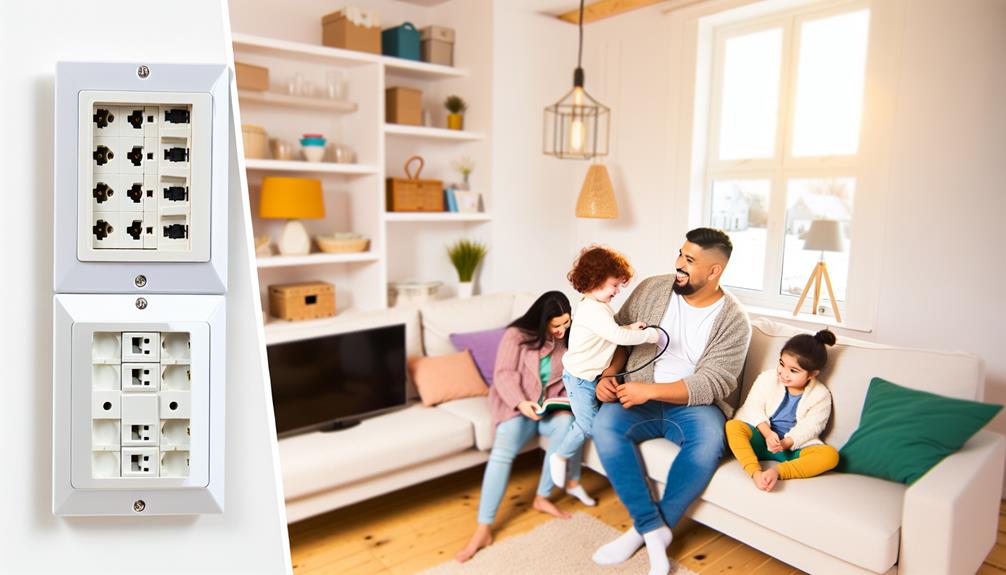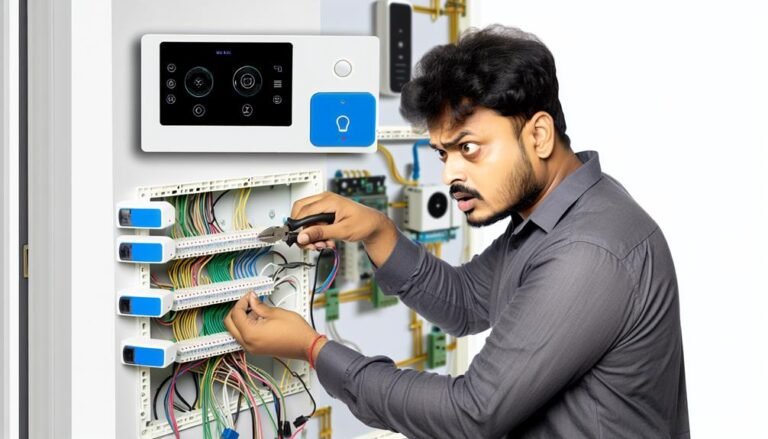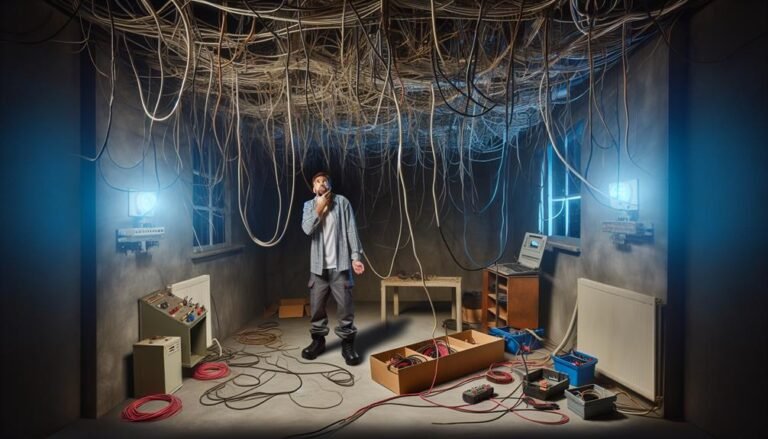Residential Electrical Safety: A Guide for Homeowners
Imagine your home as a complex electrical web, where currents surge and flow like a hidden river. Just like any river, it has its dangers – hidden rocks, treacherous currents, and unseen hazards that could potentially cause harm.
But fear not, dear homeowner, for in this guide we will equip you with the knowledge and tools to navigate this intricate electrical landscape with confidence and safety.
So, step into this world of residential electrical safety, and discover the secrets that will protect not just your home, but also the ones you hold dear.
Key Takeaways
- Understanding electrical circuits is essential for troubleshooting and diagnosing issues, ensuring electrical safety, and correct design and installation.
- Identifying potential electrical hazards such as faulty wiring, overloaded circuits, improper grounding, water and electricity combination, and damaged power cords is crucial for preventing accidents.
- Implementing safety measures like installing GFCIs, regularly inspecting electrical cords, using surge protectors, labeling circuit breakers, and hiring professional electricians can enhance residential electrical safety.
- Regular maintenance and inspections help prevent fires, avoid electrical shocks, ensure compliance with safety standards, and optimize the performance of the electrical system.
Understanding Electrical Circuits
To understand electrical circuits, it’s important to grasp the fundamental principles and components that make up these intricate systems.
An electrical circuit is a closed loop through which electric current flows. It comprises various components, including a power source, conductors, switches, and loads.
The power source, typically a battery or an electrical outlet, provides the voltage necessary to drive the current. Conductors, such as wires, serve as pathways for the flow of electricity. Switches control the flow of current, allowing you to turn the circuit on or off. Loads, like light bulbs or appliances, consume the electrical energy and convert it into other forms, such as light or heat.
Understanding the basic principles of electrical circuits is crucial for several reasons. Firstly, it enables you to troubleshoot and diagnose any issues that may arise. By understanding how the components interact, you can identify faulty connections or malfunctioning devices.
Secondly, it empowers you to make informed decisions when it comes to electrical safety. Knowing the principles allows you to take appropriate precautions and ensure that your electrical system is designed and installed correctly.
Identifying Potential Electrical Hazards
Understanding electrical circuits is essential for identifying potential electrical hazards, as it allows you to recognize potential dangers and take necessary precautions to ensure residential electrical safety. By being aware of the following potential hazards, you can safeguard your home and protect your loved ones:
- Faulty Wiring: Exposed wires, loose connections, or outdated wiring can lead to electrical fires or electric shocks. Regularly inspect your electrical system for any signs of wear and tear.
- Overloaded Circuits: Overloading a circuit by connecting too many appliances or devices can cause overheating and fire hazards. Avoid plugging multiple high-wattage devices into the same outlet.
- Improper Grounding: A lack of proper grounding can cause electrical currents to flow through appliances and even the metal components of your home, leading to electric shocks. Ensure that your electrical system is correctly grounded.
- Water and Electricity: The combination of water and electricity can be extremely dangerous. Keep electrical cords and appliances away from water sources to prevent electrocution.
- Damaged Power Cords: Frayed or damaged power cords can expose live wires, increasing the risk of electric shock or fire. Regularly inspect your power cords and replace them if necessary.
Implementing Safety Measures
To ensure residential electrical safety, it is crucial to implement proper safety measures that protect against potential electrical hazards. By taking proactive steps to safeguard your home, you can minimize the risk of accidents and ensure the well-being of your family. Here are some essential safety measures you should consider implementing:
| Safety Measure | Description |
|---|---|
| Install Ground Fault Circuit Interrupters (GFCIs) | GFCIs are designed to protect against electrical shocks by quickly shutting off power in the event of a ground fault. Install GFCIs in areas where water and electricity may come into contact, such as bathrooms, kitchens, and outdoor outlets. |
| Regularly Inspect Electrical Cords | Frayed or damaged electrical cords pose a significant fire hazard. Inspect cords regularly and replace any that are worn out or damaged. Avoid overloading outlets with multiple cords or extension leads. |
| Use Surge Protectors | Power surges can damage your electrical appliances and equipment. Install surge protectors to safeguard your devices against sudden voltage spikes. |
| Label Circuit Breakers | Properly labeling your circuit breakers ensures that you can easily identify and switch off the power to a specific area of your home during an emergency or when performing electrical work. |
| Hire a Professional Electrician | For any major electrical work, it is best to hire a licensed electrician. They have the expertise to ensure that all electrical installations and repairs are done correctly and in compliance with safety regulations. |
Regular Maintenance and Inspections
Regular maintenance and inspections are essential for ensuring the ongoing safety and functionality of your residential electrical system. By taking proactive measures and regularly inspecting your electrical system, you can identify potential hazards and address them before they become serious issues.
Here are some key reasons why regular maintenance and inspections are crucial:
- Preventing electrical fires: Regular inspections can identify faulty wiring, loose connections, or overloaded circuits that could lead to electrical fires.
- Avoiding electrical shocks: Inspections can help identify and fix any faulty outlets or switches that may pose a risk of electrical shocks.
- Extending the lifespan of your electrical system: Regular maintenance can help identify and address any issues that may cause premature wear and tear on your electrical system, prolonging its lifespan.
- Ensuring compliance with electrical codes and regulations: Inspections can ensure that your electrical system meets the required safety standards and regulations set by local authorities.
- Maintaining electrical system efficiency: Regular maintenance can optimize the performance of your electrical system, ensuring that it operates efficiently and saves energy.
Hiring Professional Electricians
When hiring professional electricians, it is important to ensure that they are licensed, experienced, and knowledgeable in residential electrical systems. You want to hire someone who will prioritize your safety and the integrity of your home’s electrical system. To help you make an informed decision, consider the following factors when selecting an electrician:
| Factors to Consider | What to Look For | Why It’s Important |
|---|---|---|
| License | Check if the electrician is licensed and registered with the relevant authorities. | A licensed electrician has met the necessary requirements and regulations, ensuring their competence and adherence to safety standards. |
| Experience | Inquire about the electrician’s experience in residential electrical work. | An experienced electrician is more likely to have encountered a wide range of electrical issues and can provide effective solutions efficiently. |
| Knowledge | Assess the electrician’s knowledge of residential electrical systems and stay up-to-date with industry advancements. | A knowledgeable electrician can identify potential hazards, recommend suitable upgrades, and ensure your electrical system is safe and efficient. |
© 2026 By Electrician Phoenix Today






